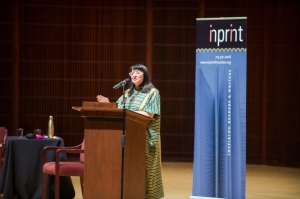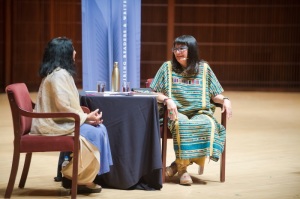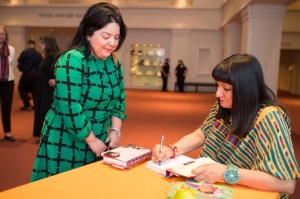“Her Teachers Thought She Was a Dreamer”: Sandra Cisneros and the Backward Glance
October 22, 2015, by Doni Wilson
 Last Monday was hot for October—a strange day, full of distractions. The radio was full of news but it all seems old. I self-medicate with baseball, flinch when my team doesn’t win.
Last Monday was hot for October—a strange day, full of distractions. The radio was full of news but it all seems old. I self-medicate with baseball, flinch when my team doesn’t win.
I was going to hear Sandra Cisneros read from her new nonfiction, A House of My Own: Stories of My Life. I think of her poems, the ones I taught in my multicultural literature class. My favorite was “You Bring Out the Mexican in Me.” I love that poem. Everyone had to write an imitation of this poem, but it was “You Bring Out the Blank in Me.” You had to fill in the blank to make it the right poem for you. I did it too. I think of her primarily as a fiction writer or a poet, but I think all those pieces are stories of her life, too. Maybe names have been changed—not sure.
I drive early to Rice–I don’t want to be late. When I pull in to park, the sky is pink, like the West, or Mexico, or somewhere else that you might have imagined when the real sky was too dark.
This reading is sold out. I told my students: “Hey, I think this is going to sell out.” They look at me like maybe I want them to do something. I do. Or I did. Those tickets are gone.
Sandra Cisneros, my program tells me, was “the first Mexican-American writer to be published by a mainstream publisher.” Although I knew she was born in Chicago, I always wanted to teach her work because I knew she had a house in San Antonio, and even though she had won NEA Fellowships, the American Book Award, and a MacArthur Fellowship, I always thought of her as Texan more than anything else. She lives in Mexico now, but just knowing she lived in Texas made her seem less remote, made writing seem like something you could do right here at home without New York or El-Lay, more like someone you could have a real conversation with if you really wanted to. As if things were possible.
When Rich Levy, Executive Director of Inprint, introduces her, he reminds us that she grew up in a family with seven children and that “her teachers thought she was a dreamer.” Later, when she reads her piece, “Natural Daughter,” I will be glad that that fact was put on my radar, as it is about a family mystery, and everyone has a slightly different take on it. But her piece is not just about one family mystery, but the larger mystery of how we put our family stories together, and how we have to get something, sometimes, out of the most difficult sources to crack. Why do we need to do this? Well, in part, according to Cisneros, “to heal us, to transform pain into enlightenment.” Sounds like a worthy goal to me.
When Cisneros walks out, she seems glamorous. She doesn’t look any older than the pictures I have seen of her from the eighties and before. And she is very gracious, funny, and self-deprecating. She says that “I usually hide behind poetry or fiction” but that tonight she will read nonfiction. Since the stories are true ones, she quips, “My family never reads my work. Maybe they’ll open a book now.”
 She tells us that the piece “Natural Daughter” is in Chicago Magazine. It is an essay, but no, an autobiographical slice of her life, no, a real-life mystery, no, a meta-nonfictional moment on how we figure out the truth—no, it is all of these things, all at once. You forget that just because something is easy to read that it can still be experimental and profound. You realize, after she starts reading, that she is writing her life much like fiction. But, it is not fiction.
She tells us that the piece “Natural Daughter” is in Chicago Magazine. It is an essay, but no, an autobiographical slice of her life, no, a real-life mystery, no, a meta-nonfictional moment on how we figure out the truth—no, it is all of these things, all at once. You forget that just because something is easy to read that it can still be experimental and profound. You realize, after she starts reading, that she is writing her life much like fiction. But, it is not fiction.
Her narrative is about an illegitimate daughter in her family who was hardly ever mentioned because she was part of a long-standing family secret that was treated with a strong dose of denial. It takes me awhile, like the entire piece, to realize the supreme irony of the story: early on, Cisneros tells us that “my mother doesn’t like silences,” but then of course her mother does, as we all do, when it is silencing the very thing that one does not want to hear about, can’t acknowledge.
Such revelations also help to account for Cisneros’s admission of her own curiosity, her “nagging need to poke under the bed with a broom.” Honestly, we’re glad she has it.
Cisneros brings up a constellation of issues: feminism (“It’s always worse for women, isn’t it?” she muses as she considers her half-sister’s less privileged life), the status of the immigrant (she tells us of seeing at an immigrant march a sign that read “IF YOU DEPORT ME, WHO WILL BUILD THE WALL?”) and the intersections of class and race in her family in contrast with her natural, but unacknowledged, sister. She visits the idea of dirty laundry, and the significance of secrets long after their initial potency has waned, if it ever does.
She reminds us of the ironies of life, as when we claim “We are not dogs!” even if we are acting like them. Her own stories seem like they could happen to anyone, hit close to the bone. When she thinks about the sister whom she never really knew, we think about her too, as if we might have one somewhere. When Cisneros says, “To me, abandonment is worse than death,” we see what she means, even when we might have been thinking all along that nothing is worse than death. We see the difference when someone leaves to go to another realm, and when you “have someone leave of their own volition.” She is right: it is a harder pill to swallow. It shakes us up. She asks, “How could the man I knew [her father] be the same one to walk away from a daughter?” The answers are complex, uncomfortable, maybe even unanswerable. They leave us hanging.
Even until now, as when Cisneros confides that she sees this sister’s face everywhere and especially in “the poorest of the poor” as she travels the globe, far and away, more attached to the places that she has lived than the blood relative who was never really a part of her real life, yet can never leave her imagination regardless of the pressures of family denial. This lends a poignancy to the question of “what tribe?” does she belong to when asked by the census in a humorous section of her narrative that probes the way we classify ourselves based on race or ethnicity. The audience realizes that if our own family members don’t muster up the qualifications for membership in our tribe, then indeed, we have a long way to go in other arenas for reconciliation, understanding and acceptance.
Cisneros delivers this in such an entertaining and humorous way, that at times you forget that she is serious as a heart attack about these things. Until you don’t.
The Q & A is with the friendly and talented Chitra Divakaruni, who teaches in the University of Houston Creative Writing Program. Divakaruni asks Cisneros how nonfiction is different, and Cisneros says, “I let things go where they want to go,” and invokes Fellini’s quotation that “The pearl is the oyster’s autobiography”—the epigraph for the entire collection. Yet, we believe her when Cisneros says that she is trying to be “as honest and as true as I can make it.” We believe her—she isn’t trying to sugarcoat anything. But, it is funny when she says, “If they don’t like it…well, at 60 it’s like, who cares!”
The most interesting thing she says is that “in the US you get censored before you write it”—and that “we censor ourselves before we can even think.” She refers to our era as an “age of terror,” because we are terrified of saying certain things, to the point that “we can’t think straight.” When she crosses the border from Mexico to the US, she feels a lot of sadness and fear in US culture.
The most interesting thing she says is that “in the US you get censored before you write it”—and that “we censor ourselves before we can even think.” She refers to our era as an “age of terror,” because we are terrified of saying certain things, to the point that “we can’t think straight.” When she crosses the border from Mexico to the US, she feels a lot of sadness and fear in US culture.
She is a big believer in the “spiritual epiphany”—something that does not seem to get much traction in American culture. She explains that “the spirits speak to you in Mexico” and that the “border between the living and the dead” is more open, with more freedom of movement. She thinks of these spirits as allies. It makes me understand what she means in a larger sense when she tells us about how she realized that “you are not your house,” and how that moment of enlightenment helped her have the courage to move. Borders are not always borders.
 And that movement, from many houses over time, is part of her life’s story, and part of her larger trajectory of moving “fear and any personal agenda out of the way” when she writes.
And that movement, from many houses over time, is part of her life’s story, and part of her larger trajectory of moving “fear and any personal agenda out of the way” when she writes.
As the Q & A progresses, I realize that there are really few direct questions, more wistful inquiries and profound moments of gratitude from audience members who have been so moved by Cisneros’s writings in multiple genres. She tells us of her concern about “the vilification of the poor,” and how arts programs are necessary, keep getting gutted, result in kids that “get washed away” and left out, leave her with questions about why there are so few Chicano and Chicana writers, something that “breaks her heart.” She says that “I remember the flotsam and jetsam of life. I remember emotions.” Yet, it still seems like so much more.
Near the end, she tells us of making an altar to her mother—someone who was a frustrated artist. She reminds us of the importance of intuition and emotion, and that the most important reasons to write have nothing to do with publication. I like how she gives advice about writing with kindness and without condescension. She is encouraging, but not in a false way. She says that the “longer you sit the deeper and better your writing.”
 On a serious note, she says that writing is “a mirror into our heart” and that it is healing, and that if you stick with it, you will “find yourself one day astonished at your own life.”
On a serious note, she says that writing is “a mirror into our heart” and that it is healing, and that if you stick with it, you will “find yourself one day astonished at your own life.”
She also says, about this latest collection, “I think my loves will be looking for themselves in this book. But that is for the next one.” We laugh, but a lot of people sitting in the audience do indeed love her, and they will find themselves in her words. The ones in which she has followed the advice she gives, to “find what works for you…find your fingerprint, your voice, your place of passion.”
After all, she has already told us, “You can’t fake a passion.” It makes you want to find one.

